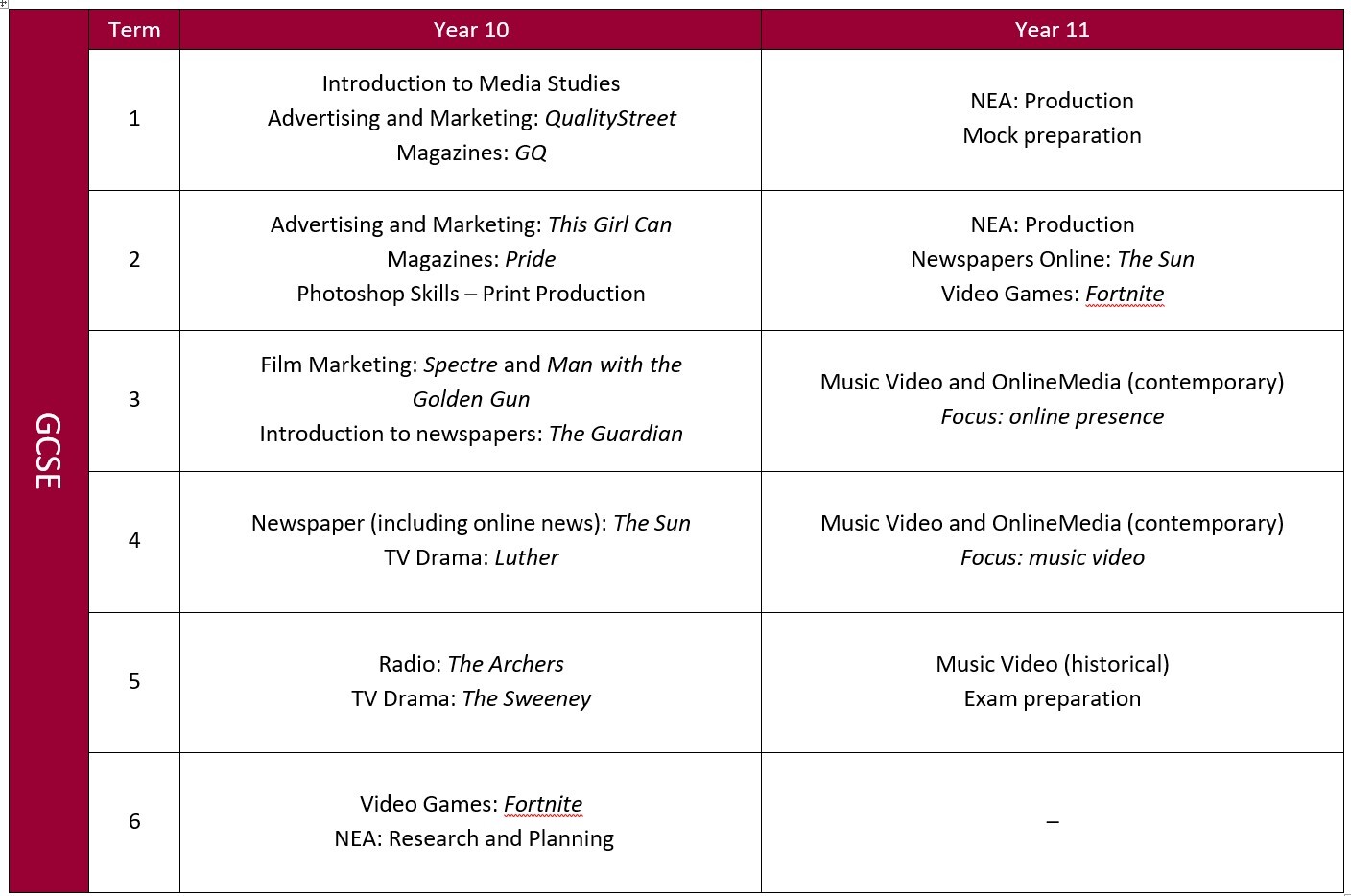Media
BackHead of Department: Mr J Stephens
Teachers: Above plus Mrs K Calvert
Technician: Mr J Tidy
The Media Studies department currently offers Eduqas GCSE and Eduqas A Level Media Studies courses. Media Studies as an academic subject encompasses texts from television, online, social and participatory media, and print media including advertising and magazines. The aim of the subject is to be able to critically consider the media that saturates modern life – both old and new. Students learn to analyse a wide range of texts looking at audio visual and written language, encouraging them to develop their own opinions on how the media represents the world. These skills are then brought together in their own production work.
The Media Studies department is consistently very successful at both GCSE and A Level. The course is delivered in two computer suites, and students have access to equipment and digital video editing facilities such as the Adobe Creative Cloud suite (including Premiere Pro and Photoshop). We also have a dedicated technician who supports the students through the practical coursework. Our strength is in providing students with the support needed to produce outstanding media production work, as well as providing an opportunity for challenging discussion, debate and written reflection on issues facing contemporary media audiences and institutions.
We believe in providing opportunities to learn outside the classroom: visits and external speakers, giving students the chance to engage with the media in a professional context. [updated 2023/2024]
Co-curricular activities
The department runs a number of extra-curricular learning opportunities, including the Film Makers Club, a filming trip, courses at the BFI and attendance to a national Media conference for A Level students, as well as an Oscars Award ceremony celebrating the work of Year 11–13 students.
GCSE: Years 10 and 11

What might we do in a Media Studies lesson?
- Watch a range of adverts and analyse camera shots, angles, sound, editing techniques and special effects; write an essay for homework commenting on how the product or brand is represented through these techniques.
- Research the production process behind films such as Spectre. Students would find out what the budget for the film was, how the film was marketed to the audience, and how merchandise tie-ins were used in the promotion of the film.
- Analyse music videos to consider how a band projects its image, and what pleasure the video offers the music video audience.
- Create a magazine in a genre of your choice, typically sport, film or music, taking on the roles of journalist, editor, sub-editor and photojournalist.
What skills do I need to be successful?
- Interest in the media and current affairs
- Good written communication skills
- Creativity in responding to a brief
- Teamwork
- Effective research and organisation skills
- Self-motivated and committed
- Confident in use of ICT (although we will train you on all necessary software)
Allocation of marks at GCSE
- Coursework 30%
- Exam 70%
Course objectives
The EDUQAS GCSE in Media Studies offers a broad, coherent and engaging course of study which enables learners to:
- Demonstrate skills of enquiry, critical thinking, decision-making and analysis
- Acquire knowledge and understanding of a range of important media issues
- Develop appreciation and critical understanding of the media and their role both historically and currently in society, culture and politics
- Understand and apply specialist subject-specific terminology to analyse and compare media products and the contexts in which they are produced and consumed in order to make informed arguments, reach substantiated judgements and draw conclusions about media issues
- Appreciate how theoretical understanding supports practice and how practice supports theoretical understanding
- Develop practical skills by providing opportunities for creative media production.
| Component 1: Exploring the Media Written examination: 1 hour 30 minutes 40% of qualification | |
| Section A: Exploring Media Language and Representation This section assesses media language and representation in relation to two of the following print media forms: magazines, marketing (film posters), newspapers, or print advertisements. There are two questions in this section:
Section B: Exploring Media Industries and Audiences This section assesses two of the following media forms: film, newspapers, radio, video games. It includes:
| |
| Component 2: Understanding Media Forms and Products Written examination: 1 hour 30 minutes 30% of qualification | |
| This component assesses all areas of the theoretical framework and contexts of the media in relation to television and music. Section A: Television (crime drama or sitcom)
Section B: Music (music videos and online media)
| |
| Component 3: Creating Media Products Non-exam assessment 30% of qualification | |
| An individual media production for an intended audience in response to a choice of briefs set by WJEC, applying knowledge and understanding of media language and representation. |
Exam board: Eduqas
A Level: Years 12 and 13

The course offers the in-depth study of media products in relation to the four areas of the theoretical framework: language, representation, industries and audiences. Students are required to study products from all of the following media forms: tv, film industries, radio, newspapers, magazines, advertising and marketing, online, social and participatory media, video games and music video. The students have the opportunity to learn Publisher, Adobe Photoshop and Premiere Pro to create their own media texts. Creative, independent learning skills are essential, as is the desire to engage in lively discussion and debate in class. An interest in contemporary media forms such as news, social media and music is useful to the course.
|
Unit |
What is assessed? |
Assessment outline |
|
|
Component 1: Media Products, Industries and Audiences |
The examination assesses media language, representation, media industries, audiences and media contexts. It consists of two sections: Section A: Analysing Media Language and Representation This section assesses media language and representation in relation to two of the following media forms: advertising, marketing, music video or newspapers. There are two questions in this section:
Section B: Understanding Media Industries and Audiences This section assesses two of the following media forms – advertising, marketing, film, newspapers, radio, video games – and media contexts. It includes: one stepped question on media industries and one stepped question on audiences. |
35% |
Written examination: 2 hours 15 minutes |
|
Component 2: Media Forms and Products in Depth |
The examination assesses media language, representation, media industries, audiences and media contexts. It consists of three sections: Section A – Television in the Global Age There will be one two-part question or one extended response question. Section B – Magazines: Mainstream and Alternative Media There will be one two-part question or one extended response question. Section C – Media in the Online Age There will be one two-part question or one extended response question. |
35% |
Written examination: 2 hours 30 minutes |
|
Component 3: Cross-Media Production |
An individual cross-media production based on two forms in response to a choice of briefs set by WJEC, applying knowledge and understanding of the theoretical framework and digital convergence. |
30% |
Non exam assessment |
Exam board: Eduqas
Careers Education
- The department has a successful track record of students proceeding to study Film Production, Animation, Journalism, Advertising and Marketing at University. Many of those have then gone on to secure jobs in the industry.
- We are able to offer advice on different courses and universities related to the subject through visits and feedback from students. We encourage students to expand their portfolios by participating in independent projects and external competitions.
- We have a lot of resources in the department to encourage students to widen their knowledge and expertise of the subject such as films on our youtube channel (https://www.youtube.com/user/twgsbmediastudies), examples of past work, student media magazines and books.
- We have guest speakers from the industry coming in to speak about their specific roles and possible pathways into their work.
